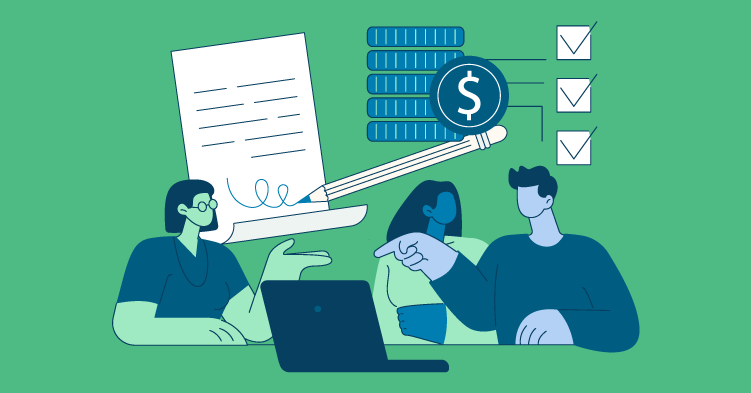You’re in need of fast funds to pay for an emergency or surprise expense, but your credit score isn’t great. Traditional lenders such as banks have declined you in the past. You’ve heard of “no credit check loans” and are curious if they might be an option to consider.
But how do no credit check loans work?
No credit check loans can offer much-needed funding to borrowers with bad credit. However, many types of no credit check loans come with risks and should be approached with caution. In this post, we’ll explore how no credit check loans work and what to consider before borrowing.
What Are No Credit Check Loans?
No credit check loans refer to a type of loan that doesn’t require a traditional hard credit check during the application process. Because many loans generally rely on credit scores to determine a person’s creditworthiness, no credit check loans are designed for individuals with bad credit or little-to-no credit history.
Some loans that may be advertised as no credit check loans include payday loans, personal installment loans and title loans. No credit check loans often come with high annual percentage rates. Some types of no credit check loans, such as payday loans, present additional risks.
How Do No Credit Check Loans Work?
If a lender advertises “no credit check loans,” it means that they don’t conduct a traditional credit check when you apply. Therefore a credit check will not show up on your credit report.
While no credit checks loans don’t come with a hard credit check, nearly all lenders have an application process with requirements that borrowers must meet. This could include any of the following:
- Identity verification.
- Employment or income verification.
- A soft credit check.
There are different types of no credit check loans, and each works differently depending on the loan type and lender that’s offering it.
What Types of Loans Don’t Require a Credit Check?
No credit check loans come in different types of personal loans that fit a variety of financial situations. Each has its own risks. Here are a few common types of no credit check loan options:
Payday loans. Sometimes referred to as a cash advance, payday loans are short-term loans designed to cover urgent financial needs until your next paycheck. Because payday lenders have short repayment terms and are designed for riskier borrowers, they come with very high annual percentage rates.
Personal installment loans. With installment loans, you can borrow a larger sum of money and repay it over a specified period in regular monthly payments (known as “installments”). Personal installment loans may or may not require a hard credit check. Those that use soft credit checks instead can be considered a no credit check loan.
Title loans. Title loans are a form of secured funding that requires upfront collateral, usually in the form of a car title. The loan amount is based on the automobile’s value, and the lender may repossess your vehicle if you’re unable to repay. Because this type of loan uses collateral, they generally come with better rates than unsecured loans.
What Do I Need to Get a Loan with Bad Credit?
While no credit check loans are often accessible for people with bad credit, there are still certain requirements you need for the loan application. These are some of the common qualifications you might need to obtain approval for a no credit check loan. However, the exact requirements will depend on the lender.
Proof of income. Lenders need to ensure you have a regular source of income to repay the loan. You may need to provide recent pay stubs, tax returns, bank statements or other documentation as proof.
Identification. You’ll typically need to provide a valid government-issued identification document, such as a driver’s license or state ID.
A verified bank account. Most lenders require you to have an active bank account so they can deposit the money and set up automatic repayments.
Age and location. You must be at least 18 years old and a resident of the country or state where you’re applying for the loan.
Specific requirements can vary among lenders, so you should be sure to check with individual lenders for their eligibility criteria.
Do Alternative Credit Checks Affect Your Credit Score?
Alternative credit checks look at data that isn’t contained on your traditional credit report. Therefore they don’t need to do a hard credit check (otherwise known as a credit inquiry) to make a decision. Instead, they utilize a soft credit check, which will not affect your traditional FICO score.
What Are the Benefits and Risks of No Credit Check Loans?
Before deciding to pursue a no credit check loan, it’s essential to weigh the advantages and disadvantages associated with this type of borrowing. Some of the benefits and risks include:
Benefits
Accessibility. No credit check loans can provide funding to those with poor credit or no credit history.
Speed. Not having to pull or evaluate your credit report leads to much faster approval times than a traditional loan.
Convenience. Many alternative lenders operate online, allowing you to complete the entire process from anywhere with an internet connection.
Risks
High interest rates. Due to the increased risk for lenders, no credit check loans often come with higher interest rates.
Predatory lending. Some lenders may take advantage of vulnerable borrowers, so it’s crucial to research and choose reputable lenders.
Potential debt cycle. If not managed responsibly, borrowers may find themselves trapped in a cycle of borrowing and paying high-interest payments.
What Are Some Alternatives to No Credit Check Loans?
No credit check loans can be a lifeline for individuals facing financial difficulties or with a less-than-perfect credit history. However, it’s crucial to approach these loans with caution and fully understand their terms, interest rates and repayment plans. You may want to consider alternative options and assess your financial situation carefully before borrowing:
Secured loans. If you have a valuable asset, such as a car or property, you may be able to secure a loan with lower interest rates by using the asset’s value as collateral. This is how title loans and home equity loans are designed.
Secured credit cards. Similar to secured loans, a credit card can be secured by putting down a cash deposit that usually becomes equal to your approved credit limit. These credit cards can help you build credit if you lack credit history or are repairing your credit score.
A co-signer. If you have a trusted family member or friend with a good credit score, they may be willing to co-sign a loan. This would increase your chances of approval.
Federal credit unions. These financial institutions often offer more flexible lending terms and may consider factors beyond just your credit score.






